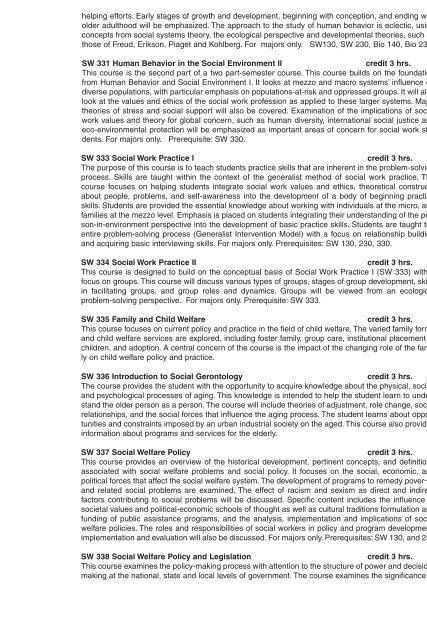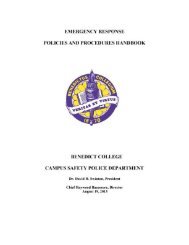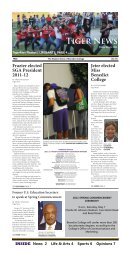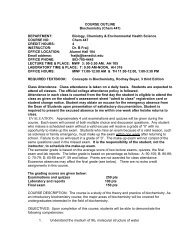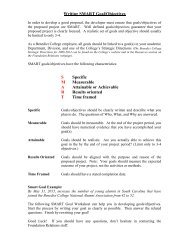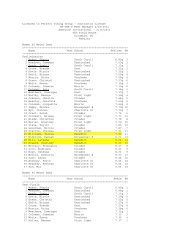2009-2011 - Benedict College
2009-2011 - Benedict College
2009-2011 - Benedict College
You also want an ePaper? Increase the reach of your titles
YUMPU automatically turns print PDFs into web optimized ePapers that Google loves.
118 SOCIAL WORK DEPARTMENT<br />
helping efforts. Early stages of growth and development, beginning with conception, and ending with<br />
older adulthood will be emphasized. The approach to the study of human behavior is eclectic, using<br />
concepts from social systems theory, the ecological perspective and developmental theories, such as<br />
those of Freud, Erikson, Piaget and Kohlberg. For majors only. SW130, SW 230, Bio 140, Bio 233.<br />
SW 331 Human Behavior in the Social Environment II<br />
credit 3 hrs.<br />
This course is the second part of a two part-semester course. This course builds on the foundation<br />
from Human Behavior and Social Environment I. It looks at mezzo and macro systems’ influence on<br />
diverse populations, with particular emphasis on populations-at-risk and oppressed groups. It will also<br />
look at the values and ethics of the social work profession as applied to these larger systems. Major<br />
theories of stress and social support will also be covered. Examination of the implications of social<br />
work values and theory for global concern, such as human diversity, international social justice and<br />
eco-environmental protection will be emphasized as important areas of concern for social work students.<br />
For majors only. Prerequisite: SW 330.<br />
SW 333 Social Work Practice I<br />
credit 3 hrs.<br />
The purpose of this course is to teach students practice skills that are inherent in the problem-solving<br />
process. Skills are taught within the context of the generalist method of social work practice. The<br />
course focuses on helping students integrate social work values and ethics, theoretical constructs<br />
about people, problems, and self-awareness into the development of a body of beginning practice<br />
skills. Students are provided the essential knowledge about working with individuals at the micro, and<br />
families at the mezzo level. Emphasis is placed on students integrating their understanding of the person-in-environment<br />
perspective into the development of basic practice skills. Students are taught the<br />
entire problem-solving process (Generalist Intervention Model) with a focus on relationship building<br />
and acquiring basic interviewing skills. For majors only. Prerequisites: SW 130, 230, 330.<br />
SW 334 Social Work Practice II<br />
credit 3 hrs.<br />
This course is designed to build on the conceptual basis of Social Work Practice I (SW 333) with a<br />
focus on groups. This course will discuss various types of groups, stages of group development, skills<br />
in facilitating groups, and group roles and dynamics. Groups will be viewed from an ecological<br />
problem-solving perspective. For majors only. Prerequisite: SW 333.<br />
SW 335 Family and Child Welfare<br />
credit 3 hrs.<br />
This course focuses on current policy and practice in the field of child welfare. The varied family forms<br />
and child welfare services are explored, including foster family, group care, institutional placement of<br />
children, and adoption. A central concern of the course is the impact of the changing role of the family<br />
on child welfare policy and practice.<br />
SW 336 Introduction to Social Gerontology<br />
credit 3 hrs.<br />
The course provides the student with the opportunity to acquire knowledge about the physical, social,<br />
and psychological processes of aging. This knowledge is intended to help the student learn to understand<br />
the older person as a person. The course will include theories of adjustment, role change, social<br />
relationships, and the social forces that influence the aging process. The student learns about opportunities<br />
and constraints imposed by an urban industrial society on the aged. This course also provides<br />
information about programs and services for the elderly.<br />
SW 337 Social Welfare Policy<br />
credit 3 hrs.<br />
This course provides an overview of the historical development, pertinent concepts, and definitions<br />
associated with social welfare problems and social policy. It focuses on the social, economic, and<br />
political forces that affect the social welfare system. The development of programs to remedy pover¬ty<br />
and related social problems are examined. The effect of racism and sexism as direct and indirect<br />
factors contributing to social problems will be discussed. Specific content includes the influence of<br />
societal values and political-economic schools of thought as well as cultural traditions formulation and<br />
funding of public assistance programs, and the analysis, implementation and implications of social<br />
welfare policies. The roles and responsibilities of social workers in policy and program development,<br />
implementation and evaluation will also be discussed. For majors only. Prerequisites: SW 130, and 230<br />
SW 338 Social Welfare Policy and Legislation<br />
credit 3 hrs.<br />
This course examines the policy-making process with attention to the structure of power and decisionmaking<br />
at the national, state and local levels of government. The course examines the significance of


